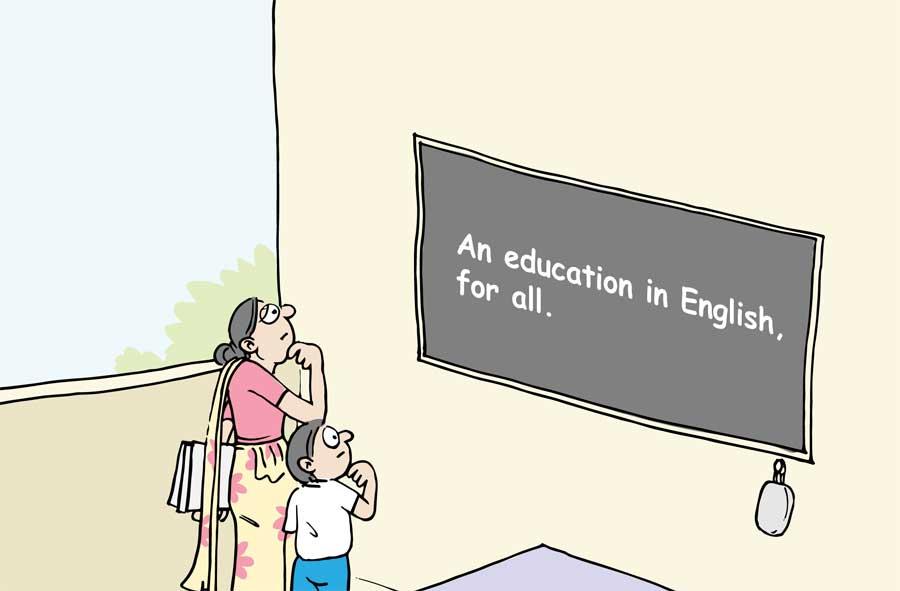Reply To:
Name - Reply Comment

An Education Ministry official talking about a proposal in the pipeline to provide schoolchildren from grade 1 to 13 with an education entirely in English has become a hot topic for discussion.
Yesterday (June 10) a popular television station aired this news where Ministry of Education Secretary Kapila Perera spelled out the initial plans regarding the proposal which is in a stage of work-in-progress. He added that a committee comprising professionals in education were working on the proposal. This proposal would likely be presented in parliament.
This news came as a bolt from the blues and officials representing teacher trade unions and even a former Minister of Education have already shot down the idea of ‘an education in English’ with vengeance. The news also added to the anxiety of parents because this is the month where application forms must be completed and sent via registered post regarding grade one admissions. Changing the medium of all subjects to English is encouraging because that’s the global language. Another plus point in doing this change is it will help students in the long run in terms of continuing studies to obtain professional qualifications. What’s workable is to make the change compulsory in grade six; after the scholarship exam.
The reason for this is that it’s essential for a child to have the opportunity to have an initial education where the subjects are taught in the mother tongue. According to INICEF guidelines children must have the opportunity to learn in their tongue during the early years of education. There is global evidence that a child’s learning outcome improves significantly when taught in the mother tongue in the early stages of education.
If this proposal sees its way to parliament and gets the nod then we’ll have two major issues regarding finding a school for children. One is the challenge that exists to enroll a child at a popular school. The second would be to enroll the child at a school where the english taught meets a high standard.
The big question to ask is whether this nation has enough willing and able teachers who’ll have to first make a change in the medium they teach in. Most teachers would struggle to make this change overnight. Academic professionals in the Ministry of Education must also consider the fact that many of the trained and graduate English teachers lack the skill when using the language. Much is left to be desired in terms of what they teach and how much of the English syllabus they cover in school.
We’ll have to view the issue of converting the mode of education to English with caution. One time senior professor of the Mahaweli Jathika Vidya Peetaya Kamal Siriwardene in an article penned to Sunday Ravaya said that ‘the aim of education is to produce a person accustomed to cultural teachings’. One of the best paths to produce this well-rounded student could be achieved by giving the initial education in the mother tongue.
We must not forget to nurture that dream of the person who is considered as the father of free education: C.W.W Kannangara. But his philosophy seems to be much misunderstood in present times. Educationist G.G Chamal Sanjeewa, who served the Health, Economics Departments of South Wales University, writing to Sunday Ravaya (2018/6/3) highlighted the fact that what Kannangara meant was creating an environment for the child to learn freely and not confining the thought on free education to providing everything free to the child inside a classroom.
Bold ideas like changing the mode of education in all grades to English must be given serious consideration. The Government can take a cue from the Wendy Whatmore Academies that operate branches in many parts of the island before making English the medium of teaching.
It will also help education authorities in this endeavour to watch the tele series ‘Iskole’ (School) telecast on Derana at 7.30 pm; children of many age groups are squeezed into one class due to lack of facilities and teachers. Those who back educations reforms in parliament must get rid of the habit of doing things and then thinking whether what they did would produce results.